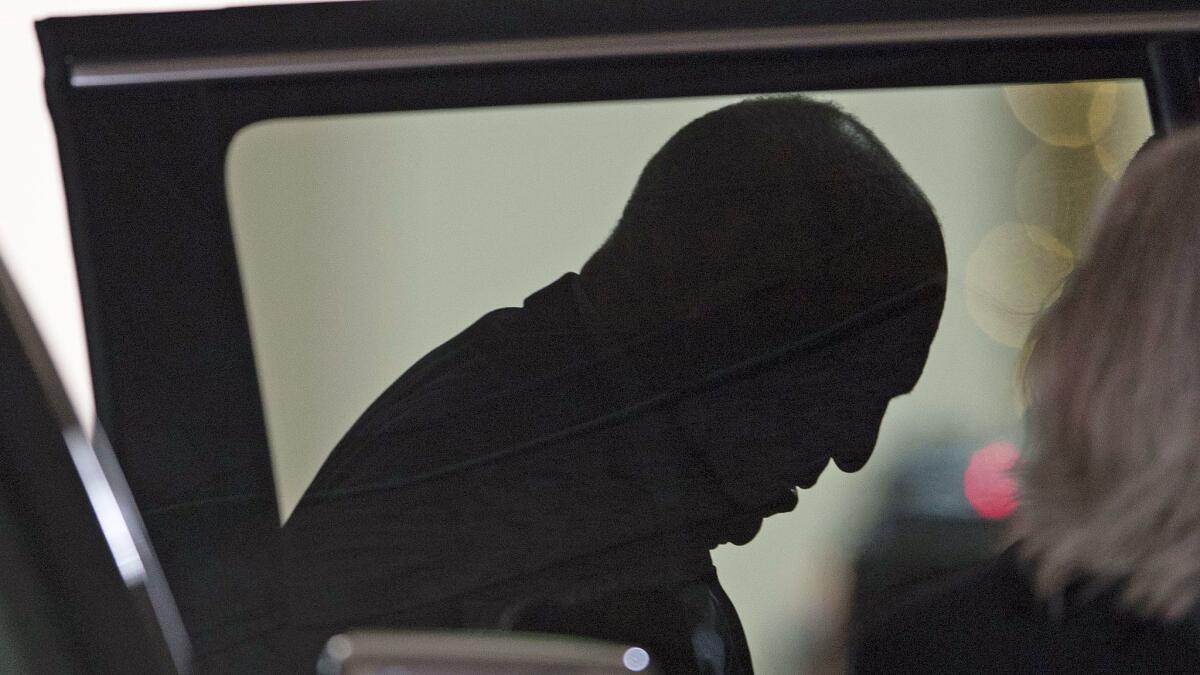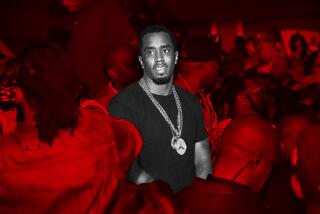As Bill Cosby trial begins, an O.J. Simpson-like constellation of race, celebrity, power and gender converges

Reporting from New York — The moment came suddenly, surprisingly. After nearly a year of sitting silently in a courtroom — and more than two years after a parade of women accusing him of sexual assault had stepped forward — Bill Cosby spoke out in court about the criminal charges against him.
“The Drake,” he said of the hotel where he is alleged to have plied a woman with Champagne — then assaulted her after she passed out — “is in Chicago.”
The clarification, offered to correct a district attorney’s mistake during a pretrial hearing in December, rang out to surreal effect around the courtroom: What defendant helps a prosecutor identify the site of an alleged sexual assault?
One thing was clear: Cosby was not going to let others define his actions for him, even with an offhand misstatement of where an incident took place.
As Cosby’s sexual assault trial begins Monday in a suburban courtroom north of Philadelphia, the disgraced entertainer will try to seize the narrative, just as he did when he gave his first major interview about the case to Sirius XM host Michael Smerconish last month.
Cosby is charged with three counts of aggravated indecent assault stemming from a 2004 encounter at his Cheltenham, Pa., mansion with Andrea Constand, a former Temple University basketball coach, in which he allegedly initiated sexual contact after giving her wine and a pill.
The outcome could determine whether the entertainer goes to prison for up to 10 years.
‘It feels like O.J. Simpson’
More than just a fall-from-grace tale, the felony trial will serve as a flash point for a host of charged topics — celebrity, criminality, race, gender and power, all intersecting in a way likely to evoke another, familiar courtroom drama.
“When you put someone who was once so highly esteemed together with all these issues, it doesn’t feel like most cases,” said David Rudovsky, a law professor at the University of Pennsylvania and a defense attorney specializing in civil rights. “It feels like O.J. Simpson.”
As with that news extravaganza, this trial will address questions both sociological and legal: Is Cosby a successful entertainer victimized by money-hungry plaintiffs and a mob of outraged Twitter users, as he and his lawyers will seek to persuade? Or is he a lecherous symbol of male privilege, someone who for years leveraged his reputation as a beloved comedian and sitcom dad to assault women and cover his tracks?
There may be no titanic Johnnie Cochran-Marcia Clark face-off awaiting in the Norristown, Pa., courthouse presided over by Judge Steven T. O’Neill. But the attorney antagonists will be a study in contrasts.
On one side is Kevin Steele, the physically imposing Montgomery County district attorney, whose approach might be described as bureaucratic dryness. A longtime presence in the suburban courthouse, the prosecutor in pretrial hearings has managed repeatedly to turn the case’s most salacious details into staid legal language.
Opposite him, lead Cosby attorney Brian McMonagle cuts a different figure. A compact Philadelphia lawyer with a flair for theatrics, McMonagle has defended a church figure enmeshed in a sex scandal and a future NBA star. At earlier Cosby hearings, he often embraced a showman’s gestures; a witness-exclusion argument had him passionately invoking Robert Bolt’s conscience play “A Man for All Seasons.”
Both sides will focus on Constand, who, so far, during more than a year of legal hearings, has not appeared in the courtroom. In the coming days, Constand, who is white, will finally testify about the night Cosby invited her to his home and, she says, penetrated her with his fingers without her consent — testimony that could determine whether Cosby goes to jail.
“For the prosecution, the key is having Constand be rock solid,” said David Harris, a professor at the University of Pittsburgh and former attorney specializing in race and criminal justice. “And the defense is going to want the jury to look hard at why it took her a year to come forward.”
I see a lot of similarities between O.J. and Cosby, in how they’re being discarded when we’ve run out of use for them.
— USC professor Todd Boyd
A focal point could in fact be not only the allegation details but sexual assault itself, a realm in which public understanding is evolving so quickly many Americans think about it differently than they did even 2 1/2 years ago, when the torrent of accusations against Cosby started. That the subject has recently been in the headlines with former Fox News host Bill O’Reilly and President Trump’s “Access Hollywood” tape could further help prosecutors.
After decades, Cosby’s unraveling begins
Culturally, Cosby’s unraveling began with a routine at a Philadelphia club in October 2014, when comedian Hannibal Buress took on the long-standing but little-publicized accusations against his fellow entertainer.
“Yeah, but you rape women, Bill Cosby, so turn the crazy down a couple notches,” Buress said.
The routine went viral. Suddenly, allegations that had been floating around for years went mainstream, and dozens of women, nearly all of whose claims had passed the statute of limitations, came forward with accounts of alleged assaults.
Legally, it started in December 2015, when a newly elected Steele, having been elected on a platform promising to prosecute Cosby, initiated charges only days before a statute of limitations on Constand’s allegations was set to expire.
Since then, the proceedings have been winding their way toward Monday’s trial, with two key victories for the prosecution along the way.
One was a ruling from O’Neill earlier this year allowing an additional accuser to testify against Cosby under Pennsylvania’s so-called Prior Bad Acts clause. (The prosecution had sought 13 such witnesses). Identified as Prior Alleged Victim Six, the woman said she visited Cosby at his bungalow at the Hotel Bel-Air in 1996, when he allegedly gave her a pill and violated her.
The judge also decided to admit deposition testimony from a Constand civil suit more than a decade ago in which Cosby admits to buying Quaaludes in order to have sex with women.
But the prosecution’s case also contains problems. For starters, there is no physical evidence. And in the year during which Constand didn’t report the incident, she maintained intermittent contact with Cosby.
The defense will look to exploit those issues, and do anything possible to challenge Constand’s credibility — without going too far. “If they go after her too hard, the jury will see her as victimized again and it will backfire,” Rudovsky said.
X factors: Celebrity, race, wealth
Celebrity will be an X factor too. The defense has suggested it will make Cosby’s celebrity and wealth an issue, citing the many civil suits brought against him — including one filed by Constand, in which she received an undisclosed settlement — as the primary motivation for initiating the allegations. But this could have unintended consequences: In the current anti-elitist climate, can a millionaire icon really be portrayed as a victim?
The other question: What role will race play? In the Smerconish interview, Cosby intimated he believed racism was a reason for his prosecution. “I just truly believe that some of it may very well be that,” he said.
Yet overplaying that issue — with a jury that includes only two African Americans — could also backfire.
“Race in a trial is a hand grenade,” said Harris. “And when a hand grenade blows up, you don’t know where all the fragments will go.”
Still, the issue of race is undoubtedly one of the lenses through which the trial will be viewed. And while the charges against Simpson and Cosby are different, their status as celebrated black men facing very public trials has invited inevitable comparisons.
“I see a lot of similarities between O.J. and Cosby, in how they’re being discarded when we’ve run out of use for them,” said Todd Boyd, a professor of race and popular culture at USC.
“This is a not a defense of Bill Cosby and it’s not to say there’s a witch hunt. He is guilty of what he’s guilty of. But there’s a long history of black male entertainers where we say, ‘We enjoyed the show and we’ve moved on and don’t need you anymore. So now we’ll hold you accountable for the things you did because you’re no longer of use.’
The issue of race is hardly straightforward in the Cosby trial. Not least among the complexities: Prior Alleged Victim Six identifies as African American, potentially negating attempts to say Cosby is being targeted due to the color of his skin.
Representing that witness is Gloria Allred, the outspoken Southern California lawyer who hovers over the Cosby case. She serves as attorney for nearly three dozen of the 60 accusers — some in civil suits — who’ve stepped forward to accuse Cosby in the press.
“These two women who are testifying are very brave. And they speak for many other women, who have never had their day in court,” Allred said. “What do I expect? I expected the unexpected.”
The biggest of those surprises could come with Cosby himself. He told Smerconish he wouldn’t testify. But he could change his mind, depending on how the trial is unfolding.
“We have to remember that Cosby is a beloved entertainer, a performer first and foremost,” Harris said. “He could be more convincing to the jury than your typical witness.”
Whether he testifies or not, the attention the case brings is welcomed by victims’ rights advocates.
“It’s a chance to educate people on how rampant this is in Hollywood,” said Angela Rose, the founder of the victims’ rights advocacy group PAVE. On trial, she said, is the very notion of male privilege.
“Sexual assault is the most under reported crime in the country,” she said, “and this is a case where a woman has courageously stepped forward and someone is being prosecuted.”
Twitter: @ZeitchikLAT
ALSO
Bill Cosby’s ‘Little Bill’ makes the list of most banned books in 2016
What life is like behind bars for O.J. Simpson Prisoner 1027820
Bill Cosby says he won’t testify in criminal trial, suggests racism is at play
More to Read
Sign up for Essential California
The most important California stories and recommendations in your inbox every morning.
You may occasionally receive promotional content from the Los Angeles Times.











